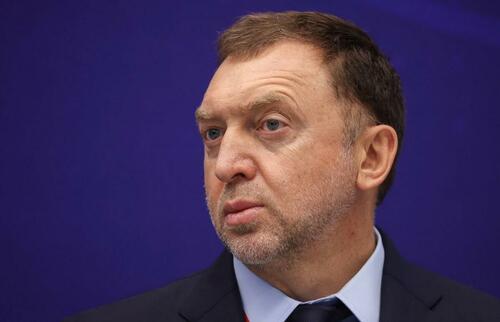EU Targets Putin’s Daughters & Handful Of Oligarchs In Latest Round Of Sanctions
Following yesterday’s report (later confirmed by the European Commission) that an impending fifth round of EU sanctions against the Russian economy would include a ban on coal imports, which would break the “energy taboo” (the bloc has so far been reluctant to stifle imports of Russian oil, gas and coal thanks to its dependence on these products), more details about the upcoming sanctions package have been reported Wednesday morning.
Oleg Deripaska
In addition to the proposed ban on coal imports, the sanctions package was also said to include new restrictions on the Russian banking sector and bans on certain chemical exports:
-
Russian vessels and trucks will also be prevented from accessing the EU, further crippling trade with Russia, the source said, adding that exceptions will be made for energy products, food and medicines.
-
The EU will also ban all transactions with VTB and another three Russian banks which had already been excluded from the SWIFT messaging system, the source said.
-
Dozens more individuals, including oligarchs and politicians, will be added to the EU sanction list, the source said.
The latest reports are chiefly concerned with this last measure. According to Bloomberg and the FT, the EU is discussing Wednesday whether to sanction Russian aluminum tycoon Oleg Deripaska (best known to Americans for his relationship with Paul Manafort, and for being targeted with sanctions by the Trump Administration which forced him to dilute his stake in Rusal), along with a handful of other executives, including Alexander Shulgin, the head of Russian e-commerce platform Ozon, Boris Rotenberg, a close business associate of President Putin, and Said Kerimov, who controls Russia’s largest gold miner Polyus, according to Bloomberg.
As for Rotenberg, a Finnish citizen, he made his fortune thanks to tenders and contracts from state-controlled oil and gas companies. He and his nephew, Igor, are set to be placed under sanctions for their close ties to Putin. Arkady Rotenberg, Boris’s brother, is already under sanctions.
The new list of individuals targeted by the EU also includes Vladimir Bogdanov, director-general of Surgutneftegas, Russia’s third-largest oil producer which accounts for about 10 per cent of the country’s crude production.
But it’s not just businessmen who are being targeted. Per the FT, Ekaterina Tikhonova and Maria Vorontsova, Putin’s daughters from his first marriage, are also being targeted for allegedly benefiting from the Russian state. Of course, sanctioning Putin’s daughters would only have “symbolic” significance, since neither of them control significant assets, as BBG explained.
If approved, those targeted by the sanctions will be subject to asset freezes and travel bans.
As far as Gref and Shulgin are concerned, the bloc’s justification for targeting them is based on their attendance at a televised meeting with Putin in the Kremlin on the day the invasion began. Ambassadors from EU member states are meeting in Brussels on Wednesday to discuss the proposal before it is officially proposed to become law.
The latest round of EU measures is also expected to include export bans worth €10bn in areas including quantum computers and advanced semiconductors, and bans worth €5.5bn, on products including wood, cement, seafood and liquor. The EU is not expected to hit Russian oil exports in the current round of sanctions, but officials are discussing ways of including the sector in future rounds of penalties.
German media reports on Wednesday suggested that the sanctions on Russian coal could be just the beginning, and that further bans on gas and oil might be possible (of course, the consequences for the German economy would be extremely dire if this were to happen).
EU Council President Charles Michel told the EU Parliament on Wednesday that “I think that measures on oil and even gas will also be needed sooner or later.” Of course, that’s much easier said than done.
When it comes to the sanctions on Russian coal, Germany’s coal importers’ group VDKi on Wednesday said the country should be able to find alternatives to Russian hard coal imports by the peak demand winter season – the only issue is that it will likely cost more, driving inflation in the bloc even higher.
Tyler Durden
Wed, 04/06/2022 – 08:35
via ZeroHedge News https://ift.tt/My4pJN1 Tyler Durden
